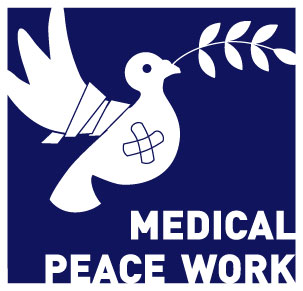 Dear friends,
Dear friends,
from November 15-17, 2013 representatives of the Medical Peace Work Partner organizations met in Nuremberg, Germany, and discussed the vision, mission and goals of Medical Peace Work for the next years. We want to provide more training, examine evidence for the effect of MPW-training on health professionals’ skills, attitudes and knowledge and for the impact of health professionals on peace outcomes. And, we want to show relevance. One of the outcomes of this meeting is the creation of the electronic newsletter which you now have in front of you. In order to increase the flow of information and to create a global MPW community we want to connect with you, our partners, friends and online course users (by December 2013, more than 6.000!) several times per year. We cannot reach our goals without a global network of collaborative partners. One of these partners is IPPNW Kenya. Medical students from IPPNW-Africa invite their colleagues to go jointly through the 7 MPW online courses in the period January – March 2014. Those who will complete the 7 courses will meet afterwards for a MPW workshop in Nairobi. The start of this initiative is coming closer. There is strong recruitment for this project in Kenya and Tanzania as the number of MPW user accounts has nearly doubled in the last weeks to more than 60 (Kenya) and around 40 (Tanzania).
So we are hopeful to promote Medical Peace Work soon among plenty of health professionals in Africa.
Wishing you Happy Holidays and peace and health in 2014,
Dr. Klaus Melf, MPW Education Coordinator
Medical Peace Work - beyond the online courses
The partner meeting in Nuremberg last month resulted in a re-orientation of the Medical Peace Work network. From now on we will have a stronger focus on providing skills training options for health professionals in different countries and regions. And, we will stimulate and engage in research within the field of Medical Peace Work. Such research can be both, about the MPW training outcomes and about MPW in practice. For this reason we have created two working groups, open to all interested partners and users: the MPW Education Working Group and the MPW Research Working Group. Please feel free to join in if you want to contribute and agree with our new vision, mission and goal. MPW vision: Healthy and peaceful societies. Our mission: Enabling health professionals to contribute to all forms and levels of violence prevention and peace building. MPW main goal: Promote the development of relevant skills, knowledge and attitudes among health professionals to enable them to contribute to peace building on a macro and micro level and to the prevention and reduction of direct, structural and cultural violence.
Contact the Education Working Group: Dr. Klaus Melf klaus.melf@gmail.com
Contact the Research Working Group: Dr. Stephan Kolb stephan.Kolb@klinikum-nuernberg.de
Medical Peace Work Africa project
Medical students from IPPNW-Africa invite their colleagues to go jointly through the 7 MPW online courses in the period January – March 2014. There will be active study circles at different universities in Kenya, Tanzania, Zambia, South Africa and South Sudan. Other countries might follow. To enable a dialogue between the study groups, a virtual IPPNW-Africa Classroom has been created on the Moodle-platform with specific discussion forum and file sharing area. Those who will complete the 7 courses will all meet in April 2014 for a face-to-face MPW workshop in Nairobi. Tentative workshop date: 11th-13th April, 2014.The purpose of doing MPW together is to learn together and share ideas on these topics in the study circles or/and the online discussion forum.
If you are interested in taking part in this new project, you are welcome to join a study circle in your country and/or to sign up to the designated IPPNW-Africa Classroom.
Please get in contact with the Medical Peace Work Africa project coordinator: Mary Iwaret iwamarx@yahoo.com
Global Health Summer 2013 in Berlin, Germany
From September 15 - 25, 2013 the Institute for Social Medicine, Epidemiology and Health Economics (Charité Universitätsmedizin Berlin), and the International Physicians Against Nuclear War Germany (IPPNW) together with Health Action International (HAI) - Europe hosted the 3rd Global Health Summer in Berlin. Part of the program was a lecture in Medical Peace Work. For those of you who could not attend our Global Health Summer, we created a documentation of the events!
Find out more: http://www.health-and-globalisation.org/
Pegasus conference May 2-4, 2014 in Toronto, Canada
Pegasus is a thought stimulating conference, convening leaders, change-makers, and participants from multiple disciplines to engage in discourse about actions and policies to improve unacceptable levels of poor health. The conference will engage stakeholders by providing a dynamic, interactive forum to share their expertise in research, education, field experiences, advocacy and policy to reduce disparities, inequities and social injustices across the three major themes: Peace, Global Health and Sustainability. The deadline for abstract submission is January 15, 2014.
Conference website: http://www.pegasusconference.ca
The success of nonviolent civil resistance
Between 1900-2006, campaigns of nonviolent civil resistance were twice as successful as violent campaigns. In their study Why Civil Resistance Works American political scientist Erica Chenoweth together with Maria J. Stephan found out that major nonviolent campaigns have achieved success 53 percent of the time, compared with 26 percent for violent resistance campaigns. According to Erica Chenoweth there are two reasons for this success. First, a campaign’s commitment to nonviolent methods enhances its domestic and international legitimacy and encourages more broad-based participation in the resistance, which translates into increased pressure being brought to bear on the target. Second, whereas governments easily justify violent counterattacks against armed insurgents, regime violence against nonviolent movements is more likely to backfire against the regime. Potentially sympathetic publics perceive violent militants as having maximalist or extremist goals beyond accommodation, but they perceive nonviolent resistance groups as less extreme, thereby enhancing their appeal and facilitating the extraction of concessions through bargaining.
See the TED talk with Erica Chenoweth about her research http://www.transconflict.com/2013/11/the-success-of-nonviolent-civil-resistance-151/
Read more: http://www.mitpressjournals.org/doi/pdf/10.1162/isec.2008.33.1.7